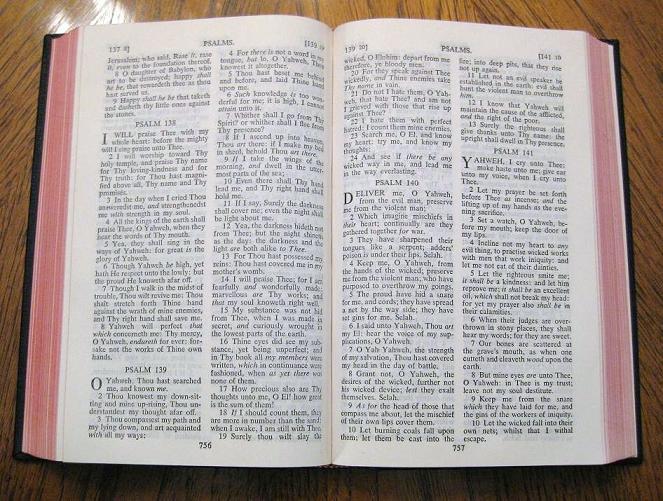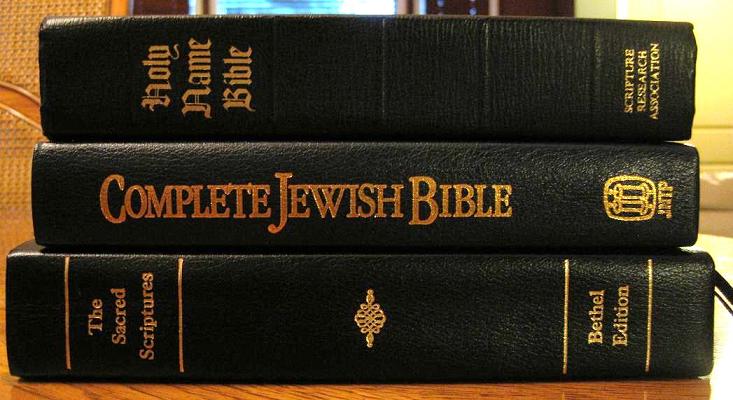Rating
| Feature | |
|---|---|
| Publication Date | 1st Edition: 1963 Reprints since then (1978 reprint reviewed here) |
| Cover | Leather Textured Hardcover |
| Size | 8.85 inches tall 5.4 inches long 1.5 inches thick |
| Binding | Smyth-Sewn |
| Thumb-Index Tabs | No |
| Text Format | Verse Format |
| Headings | None |
| Mashiyach's Words in Red | No |
| Number of Ribbon Markers | 0 |
| Gold Gilded w/ Rounded Corners | Pages are dyed red |
| Extensive Cross References | No |
| Helps | None |
| Footnotes | Basic cross references A few small textual notes |
| Concordance | No |
| Maps | Yes |
| Name of the Father | Yahweh |
| Name of the Son | Yahshua |
| Hebrew Transliterations | Minimal |
| Book Order |
Greek LXX Order Law History Writings/Poetry Prophets Western Greek Order Gospels/Acts Pauline Epistles General Epistles Revelation |
| Base Text | KJV |
| Old Archaic English | Yes |
| Manuscript Origin | None - KJV revision only |
Isaiah 9:6 - "For unto us a child is born, unto us a son is given: and the government shall be upon His shoulder: and His name shall be called Wonderful Counsellor, of the Mighty El, of the Father of Eternity; The Prince of Peace"Here we can clearly see that "of" was added into the text, denying that the son will be called the Mighty El and the Father of Eternity. Now of course, if you're a triniatarian, you don't call the Son the Father, but that's besides the point. The objective is that Traina is trying to point us away from the divinity of Yeshua.
Zechariah 12:10 - "... and they shall look up toward Him whom they have pierced, and they shall mourn for Him as one mourneth for his only son..."This revision especially pains me because it is a very important text in understanding the nature of Yeshua. The original text should say "they shall look towards ME whom they have pierced, and mourn for HIM". YHWH is talking, so this of course would indicate that He is pierced while they mourn for Him (Mashiyach) as an only son, making this an obvious change which avoids this relationship. Jehovah's Witnesses do the same thing in their revision of the Scriptures, as did the Catholic Jerusalem Bible. This text is also problematic for Orthodox Jews, so you will see the JPS and Artscroll Tanak read differently too. But the Hebrew reads "et asher dakaru" literally translating as "towards me have pierced they" where "et" acts as the direct object pointer, meaning that whoever is speaking (YHWH) is receiving the action of being pierced. To render this passage any differently in English is to butcher the Hebrew.
John 10:30 - "I and my Father are in accord"Another obvious change because both Greek and Aramaic very plainly state that "I and my Father are ONE". Understanding how this is possible is another issue, and if people want to make their own study bible footnoting their opinion/theology, fine. But it is blasphemous to change the text.
Hebrews 1:2 - "Hath in these last days spoken unto us by His Son, Whom He hath appointed heri of all things, by Whom also He hath ordained the ages"Hebrews 1:2 is one of the worst changes of all. Both Greek and Aramaic very clearly state that "and by whom He made the world", He being YHWH, and the who being His Son. Traina's revision states "by whom he hath ordained the ages". This again subtracts from any divine connection that the Son is able to have. It should be noted though that Traina missed changing this in Colossians 1:16. Now in verse 3 of Hebrews 1, Traina changed "express image of His person" to "express image of His substance". Not sure why he made the change, but I won't ramble on about the possibilities. But these changes alone are enough to give the translation effort a zero. You cannot change the Word of YHWH no matter what. To do is to create our own Elohim, instead of molding ourselves to Him.

